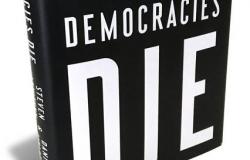When Democracies Die, They Die Quietly… But What’s the Role of Civil Society?

Save the Children’s José Manuel Roche has a book he wants you to read.
So, it turns out that nowadays democracy seldom dies through violent coup d’état. More commonly (and insidiously), democracy slides gradually into authoritarianism.
By the same token, democracy survives when democratic leaders fight for it.
#This is part of the main thesis behind the insightful book How Democracies Die by Steven Levitsky and Daniel Ziblatt. It’s a top read, especially for political geeks or campaigners interested in the crisis of modern democracy, the drivers behind the rise of populism and how democracy dies (or survives).
I found it particularly useful also to help identify our responsibility as civil society.
 The authors focus on the current crisis in the West, but include a swift survey of authoritarian politics around the world. They look at history to provide a guide to defend democratic rule.
The authors focus on the current crisis in the West, but include a swift survey of authoritarian politics around the world. They look at history to provide a guide to defend democratic rule.
Spoilers:
Democracy weakens when “unwritten norms and rules of behaviour” are systematically broken. It turns out that respecting the constitution and rule of law is not enough. Two key unwritten norms commonly broken by authoritarians are:
1) mutual tolerance and recognizing the legitimacy of rivals – they are not existential enemies (and that also applies to rivals inside your political party!) and
2) institutional forbearance: having the power to do something when in charge does not mean leaders should actually use that power. Interestingly, Andrew Marr’s book review calls on UK political leaders to stick to the foundational but unwritten norms of behaviour in British democracy, especially questioning the use of inappropriate language in social media to refer to their opponents.
But it applies also to the way political dissent is handled inside political parties and legislative bodies. It’s a no-brainer that civil society also has a responsibility and a choice – whether to be part of the problem or contribute to the solution – especially in its choice of tactics and use of social media. My intuition is that civil society can also contribute to create space for public deliberation as one of the multiple ways to address growing polarization in our societies.
Recognize early warnings. Examples around the world show that authoritarians use three key strategies:
1) Capturing the referees (whether courts or regulatory bodies),
2) Side-lining key players (opposition politicians or other national leaders), and
3) Rewriting or reinterpreting the rules of the game (constitutional or electoral rules).
According to the authors, history shows that authoritarian leaders come to power helped by mainstream political parties or politicians who think they can “control the outsiders”. As Eliane Glaser rightly points out, the authors question our own understanding of “democracy” and the role of democratic leaders in stopping authoritarianism. When do tactic that are effective to achieve a short-term political win also put at risk the long-term foundations of democracy? This is equally a question also for Civil Society organizations. And what it is our role in identifying these early warnings or becoming “custodians of greater public goods”? Overall message? Whatever you do, don’t play the useful fool by reinforcing political practices that undermine democracy.
Attention to the underlying causes. Explaining what is driving the rise in populism or growing polarization is a hot topic right now. In the USA for example, there is a striking association between growing income inequality and political polarization. In the absence of serious campaign funding regulation, a rise in income inequality reinforces the influence of outsiders’ money over political systems – certainly the case in the USA. The rise of inequality comes up in various other discussions, but so does the stagnation in living in standards, and the backlash against globalization. The implications are obvious – are Civil Society organizations tackling the root causes? Are we contributing to the solution?
Defence of rights and institutions. Whatever we do, we should not become part of the problem by using the same tactics that reinforce and accelerate the decline of our democratic norms. The authors argue that public demonstrations and other forms of civil disobedience are not enough. It’s key to mobilize the vote for democratic leaders to gain power and keep out those with authoritarian impulses. Civil Society also has a role in building broader coalitions in defence of democracy, and political leaders need to put long-term stability ahead of short-term political gains. In my view, there are plenty of lessons here for Civil Society Organizations, whether it is to mobilize the public, help build democratic institutions, or join the cause of democratic coalitions.
Anyhow, those are my take-aways, but I really recommend reading the book for yourselves. For a quick glance, also read Nick Cohen’s review, Andrew Marr’s, or Eliane Glaser’s. Or if you are a podcast type of person and prefer to listen while cooking or getting ready in the morning, this podcast is for you with Ezra Klein, the founder of Vox, interviewing the authors.
José Manuel Roche, Save the Children's Head of Research.
This first appeared on:



